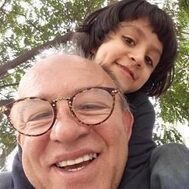 I chose Neurology as my specialty for the simple reason that, among all my rotations, it was my patients that had neurological problems which most pricked my curiosity and incited my passion for challenge. I achieved the most incredible sense of satisfaction and enjoyment from delivering health care to these patients. Though the medical school has given me concrete knowledge that will prepare me for this field, my life outside of school has prepared me in ways that can't easily be measured. I remember the day after returning from school, my family surrounded my unconscious uncle, who was having seizures. I helplessly watched him in the chaos of my house with no one capable of helping him. The sad and worried faces of my grandparents are still fresh in my memory. As I grew older, I saw not only my uncle fighting with epilepsy but also many other people in my hometown suffering from debilitating neurological illnesses. The desire to make a difference in these people's life has played a vital role in increasing my inclination toward neurology. As a result, I decided to pursue my career in neurology.
I chose Neurology as my specialty for the simple reason that, among all my rotations, it was my patients that had neurological problems which most pricked my curiosity and incited my passion for challenge. I achieved the most incredible sense of satisfaction and enjoyment from delivering health care to these patients. Though the medical school has given me concrete knowledge that will prepare me for this field, my life outside of school has prepared me in ways that can't easily be measured. I remember the day after returning from school, my family surrounded my unconscious uncle, who was having seizures. I helplessly watched him in the chaos of my house with no one capable of helping him. The sad and worried faces of my grandparents are still fresh in my memory. As I grew older, I saw not only my uncle fighting with epilepsy but also many other people in my hometown suffering from debilitating neurological illnesses. The desire to make a difference in these people's life has played a vital role in increasing my inclination toward neurology. As a result, I decided to pursue my career in neurology.
During my final year of medical school, I selected electives about neurology whenever possible. I applied myself diligently to gaining a foundation with which to localize neurological lesions and formulate differential diagnoses. Learning as a student and then working as an intern in one of the largest hospitals in India entailed an ongoing problem-solving attitude, constant vigilance, and analytical skills. I valued the opportunity to talk to people, not only about their diseases but also about their lives. And it never ceases to amaze me that I learned as much from a patient’s history as I did from their lab tests and investigations. These experiences enriched my interpersonal and communication skills.
After graduation, I worked as a resident physician at the Big clinic in Some Country for more than a year. Working here was stimulating and enriched my skills, but I was still yearning for more knowledge. Shortly after I immigrated to the U.S. in 2000, I started as a pharmacy technician, followed by working with Dr.X in family practice. Firmly committed to a career in neurology, I started working as a medical assistant with neurologist Dr. Y. Working with Dr.Y, I discovered many of the diagnostic and intellectual challenges of neurology; a skillful history and physical exam, a carefully formulated differential diagnosis, and the management of the potentially debilitating disease. I received ample opportunity to review neuroanatomy, expand my knowledge base of underlying pathophysiologic processes of conditions, and learn new diagnostic and therapeutic modalities.
Furthermore, after passing my board exams, I rotated for 12 weeks at the Comprehensive Health Services Clinic. Presently I am assisting Dr.B and Dr.J at the University of Medicine in a combined Psychiatry and Internal Medicine Clinical Research project to prevent depression during hepatitis C therapy. Working with these beautiful doctors taught me patience and diligence. I developed mental and physical stamina and learned to manage and execute multiple tasks. Here I realized that at the end of the day, the most satisfying moment is to be able to cheer people up and make a difference in patients' life.
A career in neurology promises to be very rewarding. Because of new therapeutic modalities available to the modern clinician, the potentially incurable and debilitating diseases that were once “diagnosed but not treated” are now being treated. Furthermore, as our society’s elderly population grows larger with each passing year, the incidence of age-related neurologic diseases, and the demand for well-trained neurologists, will increase accordingly. Thus, the neurologist is not only an integral component in today’s healthcare system but will also be an essential character in the healthcare systems of the future.
The primary focus of my career goals is active clinical practice and teaching. I desire training at a reputable academic facility with an accomplished faculty dedicated to education. In addition, I seek exposure to neurological research so that I may not only learn about existing knowledge but that I may contribute to the advancement of diagnostic ability and treatment of neurologic disease. Following residency, I plan to pursue clinical fellowship training and options for a career in academic medicine.
What I bring to your residency program is a responsible, motivated, friendly, and enthusiastic person who is a great team player committed to excellence, intelligence, and personal initiative. Incorporating both the caring, confidential, physician-patient relationship and the dynamic of continuous learning, Neurology is the profession I eagerly embrace. This is the best way I can harness my own talents and abilities for the benefit of others.

